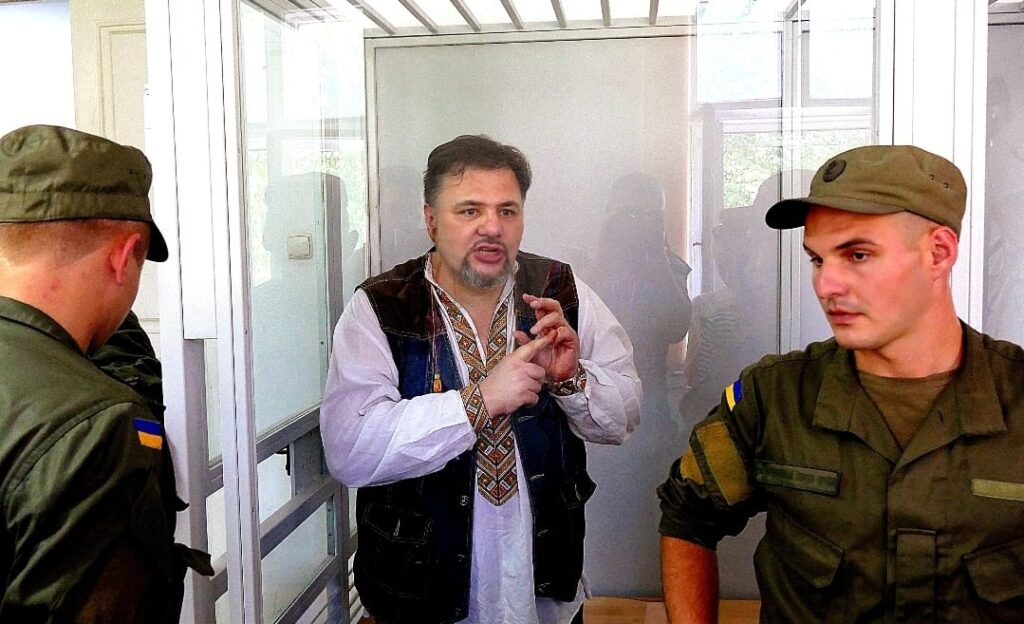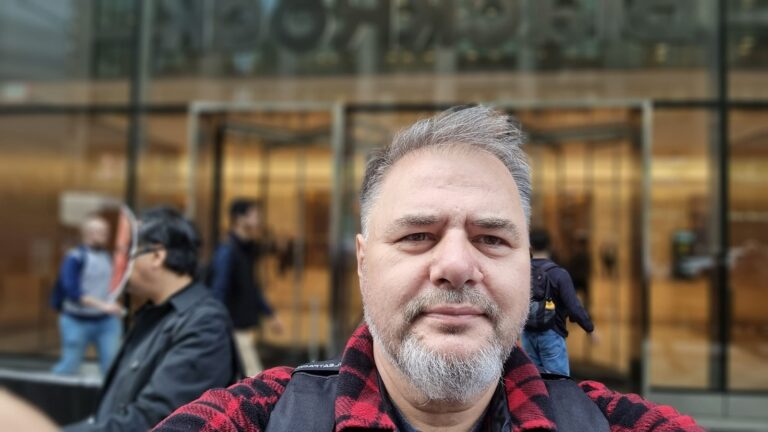Although few people outside of Ukraine have heard of Ruslan Kotsaba, within his native country he is well known as a war correspondent-turned-pacifist, who since early 2015 has publicly challenged the government's war policies and incurred the wrath of its leaders as a result. Although he took part in the Maidan protests and is from the Ivano-Frankovsk region, the heartland of radical Ukrainian nationalism, Ruslan Kotsaba's work as a war correspondent – covering the country's 8-year violent civil conflict between Ukrainian and Russian-supported Separatist forces that preceded Russia's 2022 invasion – put him in touch with the Russian-speaking populations in the East of the country, as a result of which he began to see things from their perspective as well. It was this – along with the carnage he witnessed on both sides of the conflict's front line – that led him to become a vocal peace activist, eventually founding the Ukrainian Pacifist Movement: one of three such organisations nominated last year by the International Peace Bureau for the Nobel Peace Prize.
His pacifism also led him, crucially, to vocally oppose the Ukrainian government’s role in that civil conflict. For his efforts as a pacifist he has faced a litany of persecutions: he has been physically attacked, labelled as a Russian propagandist, arrested and sent to prison – he was held in custody for a year and a half, prompting Amnesty International to call him a prisoner of conscience – and finally decided to flee the country in 2022 when facing a possible life sentence for the alleged crime of treason. Since then he's been living in exile in Brooklyn NY, waiting for the day when he’ll be free to return to his own country. It was there that I arranged to meet with him and his interpreter, Nata Potyomkin – a Russian-speaking Ukrainian from the Donbas region living in New York – at a local library last May (a full nine months ago – this late date of publication is due to a series of unfortunate delays).
A GPS navigation glitch and the generally deplorable New York City traffic made me an hour and a half late for our meeting, and I despaired of being able to conduct the interview at all. But when I arrived I found Ruslan and Nata waiting for me patiently in the library, with not a word of reproach. I soon found them both to be thoroughly down-to-earth and straightforward people.
I started off our conversation by asking Ruslan about his work during the civil conflict that began in 2014 – in particular, to explain the connection between his war correspondence and his peace activism.
How did you become a peace activist?
From the time I began working as a war correspondent, as a war journalist, I witnessed all sorts of terrible things. Those were the moments that compelled me to begin my pacifist activities. Nowadays, I don't question whether or not to do these things. After everything I've seen, I am simply a pacifist.
So it was actually your war correspondence that led you into peace activism?
My work as a war correspondent made me face the question: Am I human? Should I work as a pacifist? Should I struggle against the war?
Instead of just reporting on the war.
It was happening in parallel. First, my work as a war correspondent led me to consider both points of view on this war.
Well, this is one of the things I wanted to ask you about. Why did you decide to cover the war on both sides? And what was your experience in seeing both of these perspectives?
I considered this to be a standard of objective journalism. It became clear that the 'other side' in this conflict, the other nation, the other part of the population of Ukraine [i.e. the Russian-speaking citizens in the East – editors] was being humiliated, was being dehumanized, by our Ukrainian government. And my position was to listen to that side – to let them speak aloud.
You've paid a price, however, for taking that position. You've suffered actual persecution at the hands of your own government.
I was ready, I was absolutely ready to survive this bad experience in Ukraine. First I saw some people who were suffering, and I took a lot of interest in them. And then I saw how people were being killed in the war, how they were being scattered in pieces – literally – and I wanted to convey their point of view. The whole sense of my life at that time, my main purpose, was to convey their opinion on this conflict – correctly, without propaganda. Because the price of their opinion was their life. It was not even a job – it was my social function. And I've also been at risk. I was in a position where I could be killed at any time and my kids would be left without a father. I understood this.
In the Wikipedia article about you, you are described as a 'pro-Russian propagandist from Ukraine.' What is your response to being called a pro-Russian propagandist? Why do you think somebody would call you that?
I found myself in the situation where both sides of this conflict were blaming me for allegedly working for the other side. When we pacifists stand between the two sides of a conflict, we end up catching bad things from both sides. Both sides of this conflict are blaming me, especially the Nazis: Russian Nazis, for example, are blaming me that I am sort of pro-Ukrainian, and Ukrainian Nazis are blaming me that I am sort of pro-Russian. There are even some people now who are blaming me for being sort of pro-American. No, I deny this – I am strictly pro-Ukrainian, and I do my job. I do my work as a journalist in order to be good at what I do. Just to be good at what I do.
I understand that you are a Christian believer and that your faith somehow plays a role in your activities. Can you say a little bit about this? What role does your faith play in your peace activism?
When I saw the evil of the war, I swore to myself that, even if I had only one healthy finger left, I would use that one healthy finger to write anti-war messages. That's why I created Ukrainian Pacifist Movement. So far there aren't so many of us, but I understand that at any time the Ukrainian government could take action against us and we would all become victims. I understand this; but in any case we must carry on.

And it's because of your religious faith that you feel so strongly about this.
As a Christian pacifist, yes. And I strongly believe that every Christian should obey the commandment not to kill. All Christian civilization was built on these rules: not to kill, and to forgive. But now we have the opposite situation.
You mentioned earlier the horrors of war that you witnessed on the battlefield, on both sides. This was during the civil conflict, long before Russia's 2022 invasion. And I believe you have also spoken in the past about how this conflict affected not only soldiers, but ordinary people in society. Can you tell us a little bit about that? What changes have you seen in people – your family, your friends – since all this began nearly a decade ago? How has the conflict changed them, and their feelings?
Starting from 2014 it was a civil war, which cut through all families and groups of friends. People with Ukrainian passports were killing other people with Ukrainian passports. It is one thing to kill when you're on the battlefield, and you have a weapon and the other guy has a weapon, and the weapons are pointed at each other. But it's another thing if you do this when you live among the civilian population, if you are simply one of the people. I see Slavic people killing Slavic people, Orthodox people killing Orthodox people.
So it's not just soldiers on the battlefield, then. You're saying that ordinary people are killing other ordinary people in society.
Yes, the conflict has spread to the level of society. The state propaganda of Ukraine is sort of advocating the killing of people. What they should do, of course, is to stop stimulating the conflict through their propaganda, but on the contrary what we continue to see is the propaganda heating up the conflict.
So let's talk a little bit about the current situation, now that Russia has invaded. We're constantly told here in the West that we are doing all the things we're doing, sending all this money and all these weapons to Ukraine [much less now, in 2024 – ed.], in order to help the Ukrainians. Do you think this is really helping the people of Ukraine or not?
First of all, it has to be said that the Ukrainian government is not independent. They do everything the
US demands in this war. Zelensky is an actor and his role now is to perform the president.
So all these weapons, then, that are being sent to Ukraine – is it helping them? The West is saying that with these weapons Ukraine can win the war, and of course it will be better for them if they win than if they lose.
What are you talking about? This is not a war between Russia and Ukraine. This is a war between Russia and NATO – but this war is happening on my territory, on the territory of my country. This money we are spending now for the war, it would be much better spent on education, on medical systems, and on other good things. But when this money is spent on weapons, there are no winners. We all are losers.
I imagine many people are struck by the fact that, while you are quite critical of the Ukrainian government, you don't say much about the Russian government – which presumably lends credence to the view that you're a Russian propagandist. You are Ukrainian, and Russia has invaded your country. Aren't you angry at the Russians also, for what's happening now?
I criticise the Ukrainian government because it's my government. Yes, Putin invaded my country and he should be criticized, but rather by his own people. As to my own opinion, I am surprised that Putin invaded. I think it was a great mistake. Didn't he know how many countries would get behind Ukraine? Didn't he know the level of the conflict that would result?
I know that your first wish would have been that there be no war at all in Ukraine. But now that there is this war, what is the best outcome that you can realistically hope for?
My hope is that, in the same way that we subject people to propaganda and make them want to fight, we can also remove them from the influence of propaganda and make them normal again. I'm a realist, and I think this is realistic – but I am sure it will not happen under the Zelensky government. This is a job for the next government. As for ending the war: there is a difference between Putin and Zelensky, namely that, unlike Zelensky, Putin really is an independent president. As I said, he should be criticised by his own people. But if we're talking about who should be at the table when there are discussions to end the conflict, it should be for example Biden and Putin, not Putin and Zelensky.
The Ukrainian Pacifist Movement can be found online at https://pacifism.org.ua/en and on their Facebook page.
